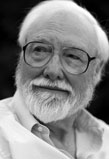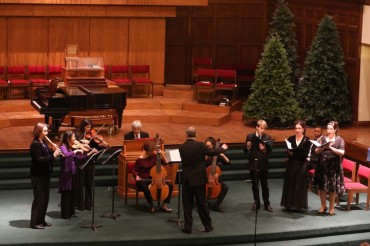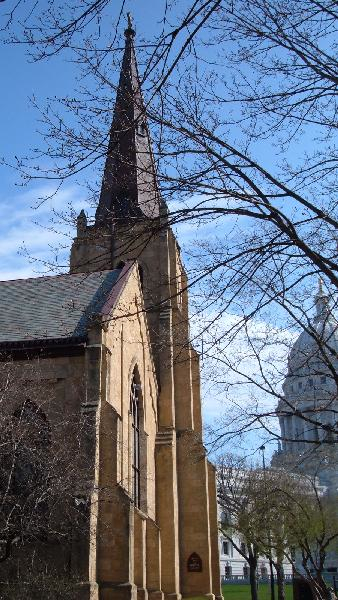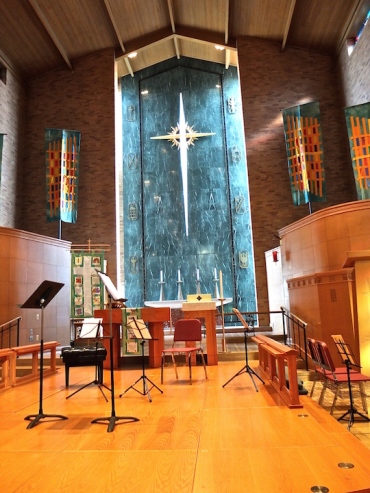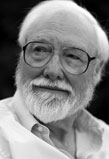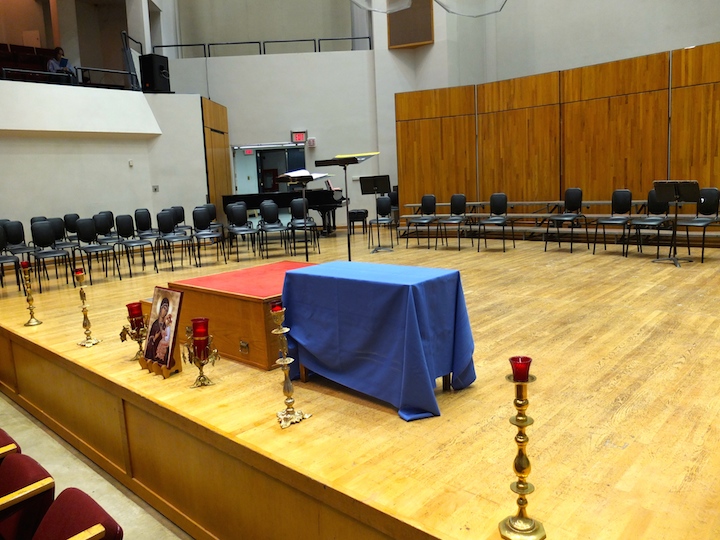The Well-Tempered Ear
The Willy Street Chamber Players give a free virtual concert this Sunday at noon. It will be posted until Dec. 31
Leave a Comment
PLEASE HELP THE EAR. IF YOU LIKE A CERTAIN BLOG POST, SPREAD THE WORD. FORWARD A LINK TO IT OR, SHARE IT or TAG IT (not just “Like” it) ON FACEBOOK. Performers can use the extra exposure to draw potential audience members to an event. And you might even attract new readers and subscribers to the blog.
By Jacob Stockinger
The Ear has received the following announcement from The Willy Street Chamber Players (below), a relatively new group that is critically acclaimed for both its adventurous and eclectic, exploratory programming and for its outstanding performances of both the traditional repertoire and new music.
The Willy Street Chamber Players (WSCP) will play a virtual online concert this Sunday, Nov. 15, at noon CST.
Access to the “Beyond the Screen” concert is FREE and no registration is required. It will be available for free online until Dec. 31 on the group’s website. Here is a link to YouTube: https://youtu.be/j5Ved4FqYSQ
Listeners can visit the WSCP website or Facebook page Sunday at concert time for links to the 70-minute performance. Here is a link to the home website: http://www.willystreetchamberplayers.org
The dynamic WSCP program was recorded live, with masks and social distance, at the historic Gates of Heaven Synagogue (below, exterior and interior during the taping) in James Madison Park in downtown Madison.
The concert will premiere on Facebook live and YouTube, providing two ways to watch from the comfort and safety of your own home.
Members of WSCP will be on hand to interact with viewers in real time through the Facebook and YouTube virtual chat during the performance. They will provide spoken program notes.
Then, immediately following the concert, you can join WSCP members for a Q&A “reception” on ZOOM at 1:15 pm.
The concert program is:
Sonata for Violin and Cello (1922) by French composer Maurice Ravel (below)
“Allegro,” the first of Four Pieces for Solo Cello (1983) by Cuban-born composer Tania León (below), which you can hear in the YouTube video at the bottom.
https://en.wikipedia.org/wiki/Tania_León
Canción de Cuna Del Niño Negro (Cradle Song of the Black Baby, 1937) by Cuban composer Amadeo Roldán y Gardes (below), as arranged by Rachel Barton Pine.
https://en.wikipedia.org/wiki/Amadeo_Roldán
“Heart O’ the Hills” from Appalachian Duets, Op. 38, No. 8 (2001) by American composer Maria Newman (below), who is the youngest daughter of famous Hollywood film composer Alfred Newman.
https://en.wikipedia.org/wiki/Maria_Newman
Duo for Violin and Cello, Op. 7 (1914), by Hungarian composer Zoltan Kodaly
Tags: #AlfredNewman, #AmadeoRoldányGardes, #AmericanComposer, #AppalachianDuets, #BlogPost, #BlogPosting, #ChamberMusic, #CityofMadison, #ConcertProgram, #CoronavirusPandemic, #CradleSong, #CriticalAcclaim, #CriticallyAcclaimed, #Cubancomposer, #FacebokPosting, #FacebookPage, #FacebookPost, #FacebookPosting, #FilmMusic, #Frenchcomposer, #GatesofHeavenSynagogue, #HomeWebsite, #HungarianComposer, #JacobStockinger, #JamesMadisonPark, #LiveMusic, #MariaNewman, #MauriceRavel, #MovieMusic, #NewMusic, #OnlineConcert, #ProgramNotes, #RachelBartonPine, #RealTime, #RecordedMusic, #SocialDistance, #StringMusic, #TaniaLeon, #TheEar, #TraditionalRepertoire, #VirtualConcert, #WillyStreetChamberPlayers, #WomenComposers, #YouTubevideo, #ZoltanKodaly, #ZoomMeeting, acclaim, adventurous, Alfred Newman, allegro, Amadeo Roldán y Gardes, America, American composer, announcement, Appalachia, arrangement, baby, beyond, black, blog, cellist, Cello, Chamber music, chat, comfort, composer, Concert, coronavirus, cradle song, Cuba, Cuban, daughter, December, downtown, duo, dynamic, eclectic, exploratory, explore, exterior, Facebook, Facebook page, famous, film music, forward, France, free, French, Gates of Heaven Synagogue, group, historic, Hollywood, Home, home website, Hungarian, Hungary, interact, interior, Jacob Stockinger, James Madison, James Madison Park, Jew, Jewish, Kodaly, like, link, live music, lullaby, Madison, Maria Newman, mask, Maurice Ravel, member, movie, movie composer, New Music, noon, November, online, oral, outstanding, page, pandemic, Park, performance, piece, play, post, program, program notes, programming, Q&A, Rachel Barton Pine, Ravel, real time, reception, recorded, registration, relative, repertoire, repertory, require, RSVP, safety, screen, share, social distance, Sonata, song, spken, string, string music, Sunday, synagogue, tag, Tania Leon, taped, taping, The Ear, traditional, Tye Ear, viewer, Violin, violinist, virtual, visit, watch, Website, Willy Street Chamber Players, Wisconsin, women, women composer, women composers, young, YouTube, Zoltan Kodaly, Zoom
Classical music: Minimalist pioneer Steve Reich turns 80 and now finds his music in the mainstream. Plus, here is the program for the clavichord concert on Sunday
Leave a Comment
ALERT: The Ear has received late notice of the program for the clavichord concert on Sunday afternoon at 3 p.m. in the Gates of Heaven Synagogue in James Madison Park.
The music, to be played by early music specialist David Schrader of Roosevelt University in Chicago, includes the Partita No. 5 in G Major, BWV 829, by Johann Sebastian Bach; the Sonata in C Major, K. 330, by Wolfgang Amadeus Mozart; the Sonata No. 44 in G minor by Franz Joseph Haydn; and the Sonata in A minor by Carl Philipp Emmanuel Bach.
For more information about the unusual concert, go to:
By Jacob Stockinger
Here is another better-late-than-never posting.
Composer Steve Reich, along with Philip Glass, was one of the pioneering giants of minimalism in classical music, which in turn influenced even pop music icons such as David Bowie and Brian Eno. (You can hear Part 1 of his influential and hypnotic work “Drumming” in the YouTube video at the bottom.)
Last month Steve Reich turned 80.
Here is a story that traces the evolution of Reich’s career and art — including his reliance on rhythm, his use of percussion and words, and his exploration and rediscovery of Judaism — from the Deceptive Cadence blog for National Public Radio (NPR):
And here is another story from The New York Times that covers Reich past, present and future:
Enjoy!
Tags: Arts, Bach, blog, Brian Eno, Carl Philip Emmanuel Bach, Carl Philipp Emanuel Bach, Chamber music, Classical music, clavichord, David Bowie, David Schrader, Deceptive Cadence, drum, drumming, Early music, Gates of Heaven, Haydn, Jacob Stockinger, James Madison Park, Johann Sebastian Bach, Judaism, Madison, minimalism, Mozart, National Public Radio, New York Times, NPR, partita, percussion, Reich, rhythm, Roosevelt University, Sonata, Steve Reich, synagogue, United States, University of Wisconsin-Madison School of Music, University of Wisconsin–Madison, vocal music, Wisconsin, Wolfgang Amadeus Mozart, words, YouTube
Classical music: The Wisconsin Baroque Ensemble opens its new season with rarities beautifully performed
2 Comments
By Jacob Stockinger
Here is a special posting, a review written by frequent guest critic and writer for this blog, John W. Barker. Barker (below) is an emeritus professor of Medieval history at the University of Wisconsin-Madison. He also is a well-known classical music critic who writes for Isthmus and the American Record Guide, and who hosts an early music show once a month on Sunday morning for WORT-FM 89.9. For years, he served on the Board of Advisors for the Madison Early Music Festival and frequently gives pre-concert lectures in Madison. Barker also took the performance photos in the review.
By John W. Barker
The season opener for the Wisconsin Baroque Ensemble was held last Saturday night at the historic Gates of Heaven Synagogue, in James Madison Park on East Gorham Street.
An unusual feature of the program this time was a kind of running backbone: the music of the little-known 18th-century French composer Benoît Guilemant.
From a collection of duo miniatures for flute and violin, six short pieces were sprinkled through the program. There was also a larger work of his, a Quartet Sonata, Op. 1, No. 3, for two flutes and violin with basso continuo. All these were spirited, clever and imaginative pieces that greatly delighted the audience.
The French Baroque was further represented by a cantata by François Bouvard (1684-1760), sung by mezzo-soprano Consuelo Sañudo, with flutist Brett Lipshutz and violinist Nathan Giglierano taking obligato parts.
The other veteran singer involved, soprano Mimmi Fulmer, delivered a pungent Italian mini-cantata by Barbara Strozzi (1619-1677).
And, from the German Baroque scene, there was a fine Trio Sonata, Op. 1, No. 2, by the great Dieterich Buxtehude (1637-1707). You can hear it in the YouTube video at the bottom.
The earliest music in the program was provided by Claudio Monteverdi: first, the delicious concertato madrigal, “Chiome doro” from the Seventh Book (1619); then three delightful pieces from the earlier Scherzi Musicali of 1607.
The ensemble this time consisted of eight performers. Besides the two singers and the two instrumentalists named, there were regulars like Eric Miller (viola da gamba), Monica Steger (flute, recorder, harpsichord), Anton TenWolde (cello), and Max Yount (harpsichord). Violinist Giglierano is a new presence in the group, and it seems as if he will be returning to the fold later this season.
One hates to think that the audience was somewhat smallish due to football. But it was a lively and—as always and justly—an appreciative one.
Tags: Arts, Barbara Strozzi, Baroque, Benoit Guillemant, Cantata, Cello, Chamber music, Classical music, Claudio Monteverdi, Dietrich Buxtehude, Early music, flute, France, Francois Bouvard, French, Gates of Heaven, German, harpsichord, historic, Isthmus, Italian, Italy, Jacob Stockinger, Madison, Madison Early Music Festival, madrigal, MEMF, Mezzo-soprano, Music, recorder, scherzi, Sonata, soprano, synagogue, trio, trio sonata, United States, University of Wisconsin-Madison School of Music, University of Wisconsin–Madison, Viola, viola da gamba, Violin, vocal music, Wisconsin, Wisconsin Baroque Ensemble, WORT-FM 89.9, YouTube
Classical music: Let us now praise churches for providing concert venues.
11 Comments
By Jacob Stockinger
The Ear received the following message from a loyal reader and thinks it is worth passing on:
“Dear Ear,
“Two of your recent posts sing the praises of Wisconsin Public Radio.
“May I also suggest that we thank area churches?
“Not only do they provide concert venues for various groups, but their active promotion of music more generally — choirs, organ accompaniment — throughout the year is worth a blessing.
“On Christmas Eve, we went to the First Congregational United Church of Christ (below, in a photo by Kent Sweitzer of the Madison Bach Musicians performing its annual Baroque holiday concert) to hear an abbreviated Nine Lessons and Carols.
“We had the benefit of hymnals and for the first time for me could actually read or sing along with the service. Plus lighting dozens of candles in the darkness and wishing the congregation of the planet peace.”
The Ear couldn’t agree more and is happy to comply.
Quite a few churches or church-like organizations come immediately to mind.
There is the First Unitarian Society of Madison (below) with its FREE Friday Noon Musicales every week and its special concerts:
There is the downtown Luther Memorial Church (below) where University of Wisconsin-Madison choirs hold their annual holiday concert and where the Madison Early Music Festival has performed:
There is Blackhawk Church in Middleton (below) where the Wisconsin Chamber Orchestra holds its annual performances of George Frideric Handel’s oratorio “Messiah”:
There is Grace Episcopal Church (below), on the Capitol Square, which is where the Wisconsin Chamber Choir held its concert this year of various settings of the Magnificat and which hosts the FREE Grace Presents series.
There is the Immanuel Lutheran Church (below), on the near east side, that hosts the Willy Street Chamber Players and the Madison Bach Musicians.
There is the St. Andrew’s Episcopal Church (below) on the near west side, which hosts many different concerts and groups:
There is Holy Wisdom Monastery (below) in Middleton, which holds a variety of concerts and hosts the Bach Dancing and Dynamite Society in the summer.
And even though it is now a landmark building rather than an active place of worship, there is the historic Gates of Heaven Synagogue in James Madison Park, where the Wisconsin Baroque Ensemble performs.
Thank you, all.
The Ear is sure there are many more that he is leaving out.
So he asks readers to please leave the names of other churches and concerts or musical events in the COMMENT section.
Tags: Advent, Arts, Baroque, Blackhawk, Chamber music, Choir, choral music, Christian, Christianity, Christmas, church, Classical music, Concert, Early music, Gates of Heaven Synagogue, George Frideric Handel, Holiday, Jacob Stockinger, Jewish, Johann Sebastian Bach, Judaism, Luther, Madison, Madison Bach Musicians, Madison Early Music Festival, Magnificat, Messiah, Music, Orchestra, organ, synagogue, United States, University of Wisconsin-Madison School of Music, University of Wisconsin–Madison, Viola, Violin, vocal music, Wisconsin, Wisconsin Baroque Ensemble, Wisconsin Chamber Choir, Wisconsin Chamber Orchestra, wisconsin public radio
Classical music: The Wisconsin Baroque Ensemble performs a program of instrumental and vocal music of 16th-18th centuries on Saturday night. Plus, tenor J. Adam Shelton gives a FREE song recital at noon on Friday.
Leave a Comment
ALERT: This week’s FREE Friday Noon Musicale, held from 12:15 to 1 p.m. at the First Unitarian Society of Madison, 900 University Bay Drive, will feature tenor J. Adam Shelton and pianist Rayna Slavova in music by Robert Schumann, Lee Hoiby, Ricky Ian Gordon and Richard Hunley.
By Jacob Stockinger
The very accomplished musicians and friends at what is probably the oldest early music, period instrument and historically informed performance group in the area write to The Ear:
The Wisconsin Baroque Ensemble invites you to a concert of baroque chamber music on this Saturday night, Oct. 10, at 8 p.m. in the Gates of Heaven historic synagogue, 300 East Gorham Street, in James Madison Park in downtown Madison.
Members (below) include Mimmi Fulmer, soprano; Nathan Giglierano, baroque violin; Brett Lipshutz, traverse; Eric Miller, viola da gamba; Mary Perkinson, baroque violin; Consuelo Sañudo, mezzo-soprano; Monica Steger, traverse; Anton TenWolde, baroque cello; and Max Yount, harpsichord.
Tickets will be sold at the door only: Admission is $20; $10 for students. For more information: call 608 238-5126, email at info@wisconsinbaroque.org, or visit www.wisconsinbaroque.org
The program includes:
Girolamo Frescobaldi (1583-1643): “Occhi che sète” and “Begli occhi, io non provo”
Johann Heinrich Schmelzer (ca. 1620–1680): Sonata Quarta
Marc-Antoine Charpentier (1643-1704): Miserere à deux dessus, deux flûtes et basse continue H 157
Antonio Vivaldi (1678-1741): Suanate da Camera, Due Violini e Violone e Cembalo, Sonata XII (Folia), opus 1 nr 12; Theme with 19 variations
Benedictus Buns (1642-1716): Ave Maria, Due Cantus cum III Instrumentis
Georg Philipp Telemann (1681-1767): Suite in e-minor from Tafelmusik, selected movements (performed in a YouTube video at the bottom by the acclaimed Jordi Savall and the Concert des Nations).
Tags: Antonio Vivaldi, Arts, Baroque, Baroque music, basso continuo, Benedictus Buns, Cello, Chamber music, Charpentier, Classical music, Early music, flute, Gates of Heaven, Georg Philipp Telemann, Girolamo Frescobaldi, harpsichord, Historically informed performance, Jacob Stockinger, Jordi Savall, Jordi Svall, Le Concert des nations, Lee Hoiby, Madison, Mezzo-soprano, Music, Richard Hunley, Ricky Ian Gordon, Robert Schumann, Schmelzer, sonat, song, soprano, Suite, synagogue, Tafelmusik, tenor, theme and variations, United States, University of Wisconsin-Madison School of Music, University of Wisconsin–Madison, Viol, Viola, Violin, vocal music, Wisconsin, Wisconsin Baroque Ensemble, YouTube
Classical music: The University of Wisconsin Choral Union says goodbye to Madison architect and longtime member Rick Levin with Rachmaninoff’s “Vespers.” A memorial for Levin will be held May 18.
1 Comment
By Jacob Stockinger
Gradually The Ear is catching up with reviews of local concerts.
April has been such a busy month for music, that I have given priority, as usual, to previews and advance features. They better serve not only the performers and presenters, but also the public.
But here is one review — really more of an appreciation than a review — that I wanted to include before it was too late.
A week today, last Saturday night, April 26, we said good-bye to Richard “Rick” Levin (below), a local architect, an avid baseball fan and a devoted chorister.
We said that good-bye through the University of Wisconsin-Madison Choral Union, in which Rick Levin (pronounced le-VINN) sang bass for 20 years or so.
But last year Rick was diagnosed with a form of oral cancer. He fought valiantly, with good humor and with hope, and many of us thought he would definitely make it.
Sadly, he did not.
He died on March 3.
So the UW Choral Union dedicated its one-night only performance of Sergei Rachmaninoff’s a cappella Vespers of “All-Night Vigil,” Op. 37, based on the Russian Orthodox liturgy, to Levin, who had started rehearsing the work at the beginning of the semester.
Rick was Jewish, the work’s liturgy was Christian; but it was the music by the Russian neo-Romantic composer Sergei Rachmaninoff (below), not the religion, that mattered.
Here is a link to some background, provided in a Q&A by the two leaders of the performance, conductors Beverly Taylor and Adam Kluck:
The performance proved a moving experience.
It is not a concert I really want to review artistically. I leave that task to this blog’s sometime guest critic John W. Barker, who usually writes for Isthmus.
Barker (below) knows the liturgical and religious aspects, the musical score, the Church Slavonic language and the dynamics of choral singing much better than I do. So I defer to Barker’s judgment and his review, which you can find a link to lower down on this posting.
But I do feel capable of making some general observations.
This is the second time – the first was about 10 years ago — that conductor Beverly Taylor, the director of the choral department at the University of Wisconsin-Madison School of Music and the assistant conductor to music director John DeMain of the Madison Symphony Orchestra, had conducted the relatively neglected work and brought it to the Madison public. She also shared her conducting duties with graduate student conductor Adam Kluck.
The two switched on and off with great continuity, and both seemed in command of the score and the style.
The chorus sang the difficult a cappella work, without accompaniment, with heart.
The singers changed their usually standing position on risers, and sat in a horse shoe-like semi-circle, which added to the intimacy. It almost felt like a comforting religious set-up, suggesting a surrounding circle of friends, the kind you might find in some church, synagogue or congregation.
Adding to the atmosphere of the work were some paintings of angels, mural-like or mosaic-like such as you might find in a Eastern Orthodox church;
There were some red candles in golden church brass holders, forming an altar next to the conductor’s podium, where even an icon of the Madonna and Child had been placed on the stage.
In addition, the Vespers opened with Father Michael, of Madison’s Assumption Greek Orthodox Church, holding aloft a candle as an invocation.
The Choral Union did everything to create an atmosphere that would make this concert seem unusual, special and less concert-like, more intimate, if you will.
And it worked.
I sat in the audience with Rick’s wife and several friends.
We were all moved, especially, I thought, by the many verses about redemption and salvation. Unbeliever that I am, I ask: How else does one move forward from such loss of love and the grief that accompanies it?
The texture of the vocal sound enveloped us. The chorus seemed to sing with precise attacks and releases, and with good balances that shifted emphasis from section to section. Rachmaninoff’s rich sense of harmony and of melodic line showed through.
But a higher purpose than turning in an outstanding artistic performance was served, at least for some of us.
We all sat moved –- by the testimony of a great composer, unafraid of emotion, and by the many musicians paying tribute to one of their own. Such is the Brotherhood and Sisterhood of Art and, for The Ear, especially of music.
It was a fine evening of fine music that served a fine purpose. I think Rick Levin would have been very pleased.
Is there more to say? Not for me, not now.
Except perhaps that a celebration or memorial gathering for Rick Levin will be held in two weeks, on Sunday, May 18, from 1:30 to 3:30 p.m., in the shelter in Warner Park (below) on Madison’s far east side.
If you feel close enough to Rick and his wife Judy to join in the words and music, the ballpark franks and food that Rick so loved from his childhood in Chicago, where he was a Chicago Cubs fan and regularly went to Wright Field (below), I am told you are welcome and even invited to attend. As for memorials, Rick Levin modestly asked only that contributions be made to Wisconsin Public Radio.
Here is a link to Rick Levin’s obituary:
And here is the link to the review of the UW Choral Union’s performance of Rachmaninoff’s “Vespers,” done by retired UW-Madison history professor John W. Barker, that I referred to above:
http://www.thedailypage.com/daily/article.php?article=42618&sid=1d5a87b16b85286f287599373df2f6be
Finally, here in its entirety is the beautiful and mysterious “Vespers” from a live performance in a popular YouTube video. Even just the opening will, I expect, move you:
Tags: a cappella, All-Night Vigil, altar, angel, Arts, ballpark, Baseball, Chicago, Chicago Cubs, Christian, church, Classical music, composer, congegregation, Eastern Orthodox Church, icon, Jacob Stockinger, Jewish, John DeMain, Madison, Madison Symphony Orchestra, Madonna, mozaic, mural, Music, painting, Rachmaninoff, Rachmaninov, Rick Levin, Romantic, Russia, Sergei Rachmaninoff, Sergei Rachmaninov, synagogue, University of Wisconsin-Madison School of Music, University of Wisconsin–Madison, vespers, Warner Park, wisconsin public radio, Wrigley Field, YouTube
- May 2024
- April 2024
- March 2024
- February 2024
- January 2024
- December 2023
- November 2023
- October 2023
- September 2023
- August 2023
- July 2023
- June 2023
- May 2023
- April 2023
- March 2023
- February 2023
- January 2023
- December 2022
- October 2022
- September 2022
- June 2022
- May 2022
- April 2022
- March 2022
- July 2021
- June 2021
- May 2021
- April 2021
- March 2021
- February 2021
- January 2021
- December 2020
- November 2020
- October 2020
- September 2020
- August 2020
- July 2020
- June 2020
- May 2020
- April 2020
- March 2020
- February 2020
- January 2020
- December 2019
- November 2019
- October 2019
- September 2019
- August 2019
- July 2019
- June 2019
- May 2019
- April 2019
- March 2019
- February 2019
- January 2019
- December 2018
- November 2018
- October 2018
- September 2018
- August 2018
- July 2018
- June 2018
- May 2018
- April 2018
- March 2018
- February 2018
- January 2018
- December 2017
- November 2017
- October 2017
- September 2017
- August 2017
- July 2017
- June 2017
- May 2017
- April 2017
- March 2017
- February 2017
- January 2017
- December 2016
- November 2016
- October 2016
- September 2016
- August 2016
- July 2016
- June 2016
- May 2016
- April 2016
- March 2016
- February 2016
- January 2016
- December 2015
- November 2015
- October 2015
- September 2015
- August 2015
- July 2015
- June 2015
- May 2015
- April 2015
- March 2015
- February 2015
- January 2015
- December 2014
- November 2014
- October 2014
- September 2014
- August 2014
- July 2014
- June 2014
- May 2014
- April 2014
- March 2014
- February 2014
- January 2014
- December 2013
- November 2013
- October 2013
- September 2013
- August 2013
- July 2013
- June 2013
- May 2013
- April 2013
- March 2013
- February 2013
- January 2013
- December 2012
- November 2012
- October 2012
- September 2012
- August 2012
- July 2012
- June 2012
- May 2012
- April 2012
- March 2012
- February 2012
- January 2012
- December 2011
- November 2011
- October 2011
- September 2011
- August 2011
- July 2011
- June 2011
- May 2011
- April 2011
- March 2011
- February 2011
- January 2011
- December 2010
- November 2010
- October 2010
- September 2010
- August 2010
- July 2010
- June 2010
- May 2010
- April 2010
- March 2010
- February 2010
- January 2010
- December 2009
- November 2009
- October 2009
- September 2009
- August 2009
Archives
- 2,491,587 hits
Blog Stats
Recent Comments
| Brian Jefferies on Classical music: A major reass… | |
| welltemperedear on What made Beethoven sick and… | |
| rlhess5d5b7e5dff on What made Beethoven sick and… | |
| welltemperedear on Beethoven’s Ninth turns 200… | |
| Robert Graebner on Beethoven’s Ninth turns 200… |
Tags
#BlogPost #BlogPosting #ChamberMusic #FacebookPost #FacebookPosting #MeadWitterSchoolofMusic #TheEar #UniversityofWisconsin-Madison #YouTubevideo Arts audience Bach Baroque Beethoven blog Cello Chamber music choral music Classical music Compact Disc composer Concert concerto conductor Early music Facebook forward Franz Schubert George Frideric Handel Jacob Stockinger Johannes Brahms Johann Sebastian Bach John DeMain like link Ludwig van Beethoven Madison Madison Opera Madison Symphony Orchestra Mead Witter School of Music Mozart Music New Music New York City NPR opera Orchestra Overture Center performer Pianist Piano post posting program share singer Sonata song soprano String quartet Student symphony tag The Ear United States University of Wisconsin-Madison School of Music University of Wisconsin–Madison Viola Violin vocal music Wisconsin Wisconsin Chamber Orchestra wisconsin public radio Wolfgang Amadeus Mozart YouTube








